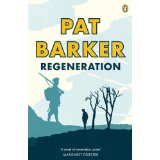The unwritten rule of WWI art and literature
With the 100th anniversary of the end of World War One fast approaching, I have been reflecting on the art and literature associated with this particularly tragic conflict. My paternal Grandfather was a Corporal in The Royal Engineers and fought at Battle of the Somme. As a teenager, I read his letters home from the trenches and his experiences had a profound affect on how I viewed the History of the period. I went on to study History at university and then taught it for over a decade in Secondary schools.
As part of my teaching career, I have addressed the facts of the 1914-18 conflict many times, but it is in the art and literature associated with the era that I have always felt the nearest approximation of the horrors of that war are truly conveyed. My favourite novels dealing with the war are Pat Barker’s Regeneration trilogy, which neither glorifies nor shies away from the darkness experienced by the men who fought on the Western Front. They are also wonderfully written novels that explore the complexities of the emotional and physical effects of the war on both soldiers and civilians.
Whether it is through the poetry of Sassoon and Owen or the paintings of Paul Nash and Stanley Spencer, or even the satire of Blackadder and Horrible Histories, the horrors, banality and, at times, comic realities of the war have been extremely well chronicled. So what is the unwritten rule that governs all the truly great art of World War One?
It is simply that there should be no glorification of conflict and violence. This is because the war of 1914-18 squandered young lives in their hundreds of thousands. There is no glory in dying for your country in this manner. That is what Wilfred Owen taught us in his poem Dulce et Decorum est and I, for one, have never forgotten the lesson.
So it does concern me to witness a new type of writing emerge, one which uses gratuitous violence to explore the impact of World War One. The BBC drama Peaky Blinders I feel falls into this trap. The 1920s gangsters who populate this series have been inured to violence because of their experiences in the trenches, we are led to believe. Yet this violence does not remain an unseen menace within the series, but is played out with unflinching detail in pretty much every episode. To me, this breaches the unspoken understanding amongst writers and artists that WWI should not be used to celebrate man’s inhumanity to man. Instead, it should be used only to guard against other such futile wars happening in the future.
Dramas like Peaky Blinders make me worry that 100 years is too long; that we have forgotten the message those wonderful artists worked so hard to convey. I sincerely hope not. Sometimes, rule breaking just isn’t appropriate or clever.
War has traditionally generated great art, but the great stuff doesn’t set out to glorify, celebrate or use violence for entertainment. If the 100th anniversary of this war to end all wars teaches us writers anything, it should teach us that.





